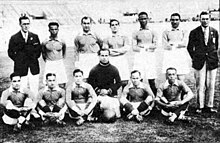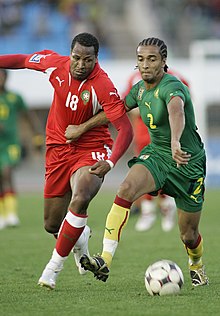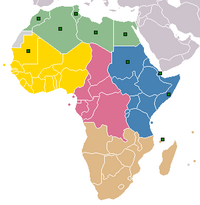Portal:Football in Africa
Introduction
Football is the most popular sport in Africa. Indeed, football is probably the most popular sport in every African country, although rugby and cricket are also very popular in South Africa. (Full article...)
This section may be unbalanced toward certain viewpoints. (October 2022) |

Selected article -
Tout Puissant Mazembe, the first sports club from the Democratic Republic of the Congo with a value of at least $10 million, was originally founded by the Benedictine monks who directed the Institut Saint-Boniface school in Élisabethville (modern-day Lubumbashi) in Katanga Province.[9] The missionaries originally decided in 1939 to established a football team for the students' Boy Scout troop, named Saint Georges FC, after the patron saint of the Scouting movement. This team affiliated itself directly in the first division of the Royal Federation of the Native Athletic Associations (Fédération Royale des Associations Sportives Indigènes, FRASI) founded by the Belgian King. At the end of the season, Holy Georges placed 3rd.
Selected biography -
Bolasie began his career with Rushden & Diamonds at the age of 16. He spent four months as a member of their youth team and then had a spell with Hillingdon Borough in the Southern Football League, before moving across Europe to play for Floriana in the Maltese Premier League. He returned to England in 2008 after being offered a trial with Plymouth Argyle, and impressed enough to be offered a two-year contract. He went on to play in the Football League for Plymouth Argyle, Barnet, Bristol City and Crystal Palace before joining Everton for a reported £25 million in 2016.
Bolasie was eligible to represent France, England and DR Congo internationally through birth, upbringing and heritage respectively. In January 2013 while playing in the Championship for Crystal Palace, Bolasie rejected the chance to represent the DR Congo in the 2013 Africa Cup of Nations claiming that he did not want to disrupt making progress in his club career. In March 2013, Bolasie was again called up to the Democratic Republic of Congo squad, and made his international debut in a 2014 World Cup qualification 0–0 draw with Libya.
Selected image -
 |
Boys playing street football in Egypt
Subcategories
Related portals
More sports portals
WikiProjects
Related task forces and sub-projects
African football task force
WikiProject Africa • WikiProject Football
WikiProject Football task forces and sub-projects
 | |
| Wikipedia ads | file info – #250 |
Topics
Open tasks

- Expand stubs: Competitions in Africa • Organizations
- Expand club articles of teams from Africa.
- Expand biographies of Africans involved in football.
- Create: Requested articles • Most wanted football articles • Requested general football articles
- Add: Infoboxes • Images (General requests, Requested images of people)
- Review: articles currently under review
- Assess: Assessment requests • Assess an article
- Revert vandalism on this portal and on African football articles
- Assist in maintaining this portal and keeping its selected content up to date.
- WikiNews: Create and submit news stories about African football for Wikipedia's sister project WikiNews.
Associated Wikimedia
The following Wikimedia Foundation sister projects provide more on this subject:
-
Commons
Free media repository -
Wikibooks
Free textbooks and manuals -
Wikidata
Free knowledge base -
Wikinews
Free-content news -
Wikiquote
Collection of quotations -
Wikisource
Free-content library -
Wikiversity
Free learning tools -
Wiktionary
Dictionary and thesaurus
More portals
Sources

- ^ "The History Of Soccer In Africa". NPR.org. 2010-06-09. Retrieved 2016-03-31.
- ^ a b c Alegi, Peter (2010). African Soccerscapes. Ohio University Press. pp. 1–2. ISBN 9780896802780.
- ^ Frimpong, Enoch Darfah. "Ghana news: A world of superstition, frustration and disillusionment - Graphic Online". Retrieved 23 September 2017.
- ^ Lacey, Marc (8 August 2002). "Kangemi Journal; For Spellbinding Soccer, the Juju Man's on the Ball". The New York Times. NY Times. Retrieved 2016-03-31.
- ^ "World Cup Witchcraft: Africa Teams Turn to Magic for Aid". National Geographic. Archived from the original on July 10, 2006. Retrieved 2016-03-31.
- ^ Andy Mitten (September 2010). The Rough Guide to Cult Football. Rough Guides UK. ISBN 9781405387965. Retrieved 2016-04-02.
- ^ "African Nations Cup overshadowed by hocus pocus | Football". The Guardian. Retrieved 2016-04-09.
- ^ Kuper, Simon (2006). Soccer Against the Enemy: How the World's Most Popular Sport Starts and Stops Wars, Fuels Revolutions, and Keeps Dictators in Power. Nation Books. p. 123. ISBN 978-1-56025-878-0.
- ^ Legge, David (17 September 2009). "Win or bust for former champions Etoile". AFP. Archived from the original on 3 January 2013. Retrieved 18 September 2009.


























